| ||||||||||||||||||||||||||||||||
| ||||||||||||||||||||||||||||||||
| ||||||||||||||||||||||||||||||||
| ||||||||||||||||||||||||||||||||
The Argentine general election of 1922 was held on 2 April. There was a turnout of 55.2%.
| ||||||||||||||||||||||||||||||||
| ||||||||||||||||||||||||||||||||
| ||||||||||||||||||||||||||||||||
| ||||||||||||||||||||||||||||||||
The Argentine general election of 1922 was held on 2 April. There was a turnout of 55.2%.
Hipólito Yrigoyen's presidency, the first elected via the universal ballot was marked by massive contradictions. One of the founders in 1891 of Argentina's first successful pluralist party, the Radical Civic Union (UCR), Yrigoyen filled 5 of his 8 cabinet positions with conservatives from the party that had monopolized power since 1874, the National Autonomists. He expounded on the virtues of "true suffrage," but removed 18 willful governors - including 4 of the UCR's own. [1] He mediated numerous labor conflicts; but proved unable to control police and military brutality against striking workers. The resulting wave of violence was compounded by the creation of the paramilitary Argentine Patriotic League by a reactionary faction in the Argentine upper class, while Yrigoyen (and the courts) remained largely silent on these developments. Over two thousand strikers perished - some burned alive in silos. [2]

Juan Hipólito del Sagrado Corazón de Jesús Yrigoyen was a two-time President of Argentina who served his first term from 1916 to 1922 and his second term from 1928 to 1930.
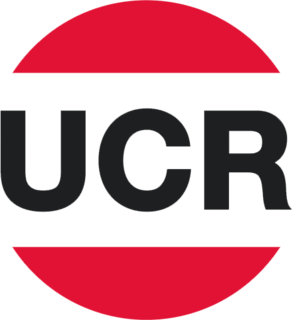
The Radical Civic Union is a centrist social-liberal political party in Argentina. The party has been ideologically heterogeneous, ranging from classical liberalism to social democracy. The UCR is a member of the Socialist International.

The Argentine Patriotic League was a Nacionalista paramilitary group, officially created in Buenos Aires on January 16, 1919, during the Tragic week events. Presided over by Manuel Carlés, a professor at the Military College and the Escuela Superior de Guerra, it also counted among its members the deputy Santiago G. O'Farrell (1861-1926). The League was merged into the Argentine Civic Legion in 1931. The Argentine Patriotic League formed part of a larger movement of patriotic leagues active in Chile and Argentina during the early 20th century.
Still, he advanced an array of reforms, including the country's first meaningful pension, collective bargaining and land reform laws, as well as expanded access to higher education and the creation of the first significant State enterprise (the oil concern, YPF). Argentina's economy rebounded strongly from World War I-related shortages of goods and credit, and Yrigoyen's vigorous labor policy helped translate this into record living standards. [3]
Collective bargaining is a process of negotiation between employers and a group of employees aimed at agreements to regulate working salaries, working conditions, benefits, and other aspects of workers' compensation and rights for workers. The interests of the employees are commonly presented by representatives of a trade union to which the employees belong. The collective agreements reached by these negotiations usually set out wage scales, working hours, training, health and safety, overtime, grievance mechanisms, and rights to participate in workplace or company affairs.

Land reform involves the changing of laws, regulations or customs regarding land ownership. Land reform may consist of a government-initiated or government-backed property redistribution, generally of agricultural land. Land reform can, therefore, refer to transfer of ownership from the more powerful to the less powerful, such as from a relatively small number of wealthy owners with extensive land holdings to individual ownership by those who work the land. Such transfers of ownership may be with or without compensation; compensation may vary from token amounts to the full value of the land.
YPF S.A. is a vertically integrated Argentine energy company, engaged in oil and gas exploration and production, and the transportation, refining, and marketing of gas and petroleum products.

Yrigoyen prepared to leave office, though not the reins of power; beset by growing rivalries within the UCR itself, he turned to one of the co-founders of the UCR: the Ambassador to France, Marcelo Torcuato de Alvear. The scion of one of Argentina's traditional landed families, the well-mannered Alvear placated Yrigoyen's fears of losing control over his Radical Civic Union, a risk Yrigoyen insured himself against by placing his personal friend and former Buenos Aires Police Chief Elpidio González as Alvear's running mate. [4] The conservative opposition in Congress that had dogged Yrigoyen early in his tenure had largely been overcome by 1920 through a string of electoral victories. The Senate, however, which was indirectly elected at the time, firmly entrenched in conservative hands only by a series of removal decrees that left 9 vacancies by 1922. [5]

France, officially the French Republic, is a country whose territory consists of metropolitan France in Western Europe and several overseas regions and territories. The metropolitan area of France extends from the Mediterranean Sea to the English Channel and the North Sea, and from the Rhine to the Atlantic Ocean. It is bordered by Belgium, Luxembourg and Germany to the northeast, Switzerland and Italy to the east, and Andorra and Spain to the south. The overseas territories include French Guiana in South America and several islands in the Atlantic, Pacific and Indian oceans. The country's 18 integral regions span a combined area of 643,801 square kilometres (248,573 sq mi) and a total population of 67.3 million. France, a sovereign state, is a unitary semi-presidential republic with its capital in Paris, the country's largest city and main cultural and commercial centre. Other major urban areas include Lyon, Marseille, Toulouse, Bordeaux, Lille and Nice.

Máximo Marcelo Torcuato de Alvear Pacheco, better known as Marcelo T. de Alvear was an Argentine politician and President of Argentina October 12, 1922 to October 12, 1928.

Buenos Aires is the capital and largest city of Argentina. The city is located on the western shore of the estuary of the Río de la Plata, on the South American continent's southeastern coast. "Buenos Aires" can be translated as "fair winds" or "good airs", but the former was the meaning intended by the founders in the 16th century, by the use of the original name "Real de Nuestra Señora Santa María del Buen Ayre". The Greater Buenos Aires conurbation, which also includes several Buenos Aires Province districts, constitutes the fourth-most populous metropolitan area in the Americas, with a population of around 15.6 million.
Most other important parties followed suit and, rather than put forth their paramount figures as candidates, they fell back on backbenchers with a reformist bent. Conservatives formed an alliance, the National Concentration, but did not nominate their most prominent figure, former Buenos Aires Province Governor Marcelino Ugarte. They instead nominated instead a respected reformer, criminal law attorney, named Norberto Piñero. Piñero had helped a needed overhaul of Argentina's penal code in 1890, a record his backers hoped could, in voters' minds, separate the hastily formed National Concentration from its ties to the violent Argentine Patriotic League. [2] An increasingly respected Lisandro de la Torre who had been unable to promote his Democratic Progressive Party into an effective centrist alternative to the UCR, chose former Education Minister Dr. Carlos Ibarguren as the nominee. Argentine Socialists, led by Senator Juan B. Justo, nominated one of his closest collaborators, and, a leader in Argentina's cooperative movement, the respected Deputy Nicolás Repetto. [4]

Buenos Aires is the largest and most populous Argentinian province. It takes the name from the city of Buenos Aires, which used to be part of the province and the provincial capital until it was federalized in 1880. Since then, in spite of bearing the same name, the province does not include the national capital city proper, though it does include all other localities of the Greater Buenos Aires metropolitan area surrounding it. The current capital of the province is the city of La Plata, founded in 1882.
Criminal law is the body of law that relates to crime. It proscribes conduct perceived as threatening, harmful, or otherwise endangering to the property, health, safety, and moral welfare of people inclusive of one's self. Most criminal law is established by statute, which is to say that the laws are enacted by a legislature. Criminal law includes the punishment and rehabilitation of people who violate such laws. Criminal law varies according to jurisdiction, and differs from civil law, where emphasis is more on dispute resolution and victim compensation, rather than on punishment or rehabilitation. Criminal procedure is a formalized official activity that authenticates the fact of commission of a crime and authorizes punitive or rehabilitative treatment of the offender.

Norberto Piñero (1858–1938) was a prominent Argentine lawyer, writer and conservative politician.
The abbreviated campaign resulted in another, landslide victory for the UCR. The party retained the Presidency overwhelmingly, and won 53 of the 82 Congressional seats at stake, losing only in two provinces controlled by provincial parties, and two controlled by dissident UCR groups; the only Senate race, that of the City of Buenos Aires, was again won by the UCR, as well, and the party ended with 15 of 27 sitting Senators (protracted vacancies excluded). Ambassador Alvear, for his part, did not campaign at all - receiving news for the April 2 results precisely where he received President Yrigoyen's phone call offering him the nomination: in the Argentine Ambassador's residence in Paris. [4]
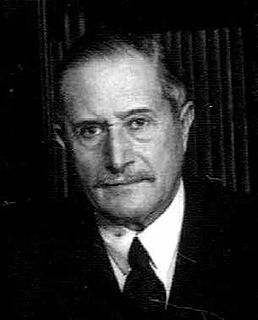
Carlos Ibarguren Uriburu was an Argentine academic, historian and politician. As a writer he was noted as one of the foremost academics of the history of Argentina as well as a leading expert on constitutional law. Politically he was initially associated with the liberal tendency amongst the country's intelligentsia before moving to far right nationalism in later life.
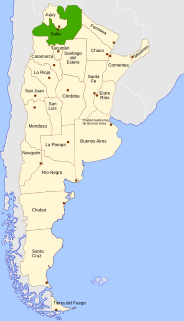
Salta is a province of Argentina, located in the northwest of the country. Neighboring provinces are from the east clockwise Formosa, Chaco, Santiago del Estero, Tucumán and Catamarca. It also surrounds Jujuy. To the north it borders Bolivia and Paraguay and to the west lies Chile.

Nicolás Repetto was an Argentine physician and leader of the Socialist Party of Argentina.
| Party/Electoral Alliance | Votes | Percentage |
|---|---|---|
| Radical Civic Union (UCR) | 406,304 | 49.1% |
| National Concentration | 64,942 | 7.8% |
| Democratic Progressive Party | 63,147 | 7.7% |
| Socialist Party | 54,813 | 6.6% |
| Dissident UCR parties (6) | 58,749 | 7.1% |
| Others | 180,196 | 21.7% |
| Positive votes | 828,151 | 94.5% |
| blank or nullified votes | 48,203 | 5.5% |
| Total votes | 876,354 | 100.0% |
| Source: [6] | ||
| Presidential Candidates | Party | Electoral Votes | |
|---|---|---|---|
| Marcelo T. de Alvear | Radical Civic Union | 235 | |
| Norberto Piñero | National Concentration | 60 | |
| Nicolás Repetto | Socialist Party | 22 | |
| Carlos Ibarguren | Democratic Progressive Party | 10 | |
| Miguel Laurencena | Principista Radical Civic Union | 6 | |
| Rafael Núñez | National Concentration | 2 | |
| José A. Correa | — | 1 | |
| Total voters | 336 | ||
| Did not vote | 40 | ||
| Total | 376 | ||
| Vice Presidential Candidates | Party | Electoral Votes | |
|---|---|---|---|
| Elpidio González | Radical Civic Union | 235 | |
| Rafael Núñez | National Concentration | 60 [lower-alpha 1] | |
| Antonio de Tomaso | Socialist Party | 22 | |
| Francisco E. Correa | Democratic Progressive Party | 12 | |
| Carlos Francisco Melo | Principista Radical Civic Union | 6 | |
| Marcial V. Quiroga [lower-alpha 2] | — | 1 | |
| Total voters | 336 | ||
| Did not vote | 40 | ||
| Total | 376 | ||
| Province | President | Vice President | ||||||||||||
|---|---|---|---|---|---|---|---|---|---|---|---|---|---|---|
| de Alvear | Piñero | Repetto | Ibarguren | Laurencena | Núñez | J. Correa | González | Núñez | de Tomaso | F. E. Correa | Melo | Quiroga | ||
| Buenos Aires City | 46 | 22 | 46 | 22 | ||||||||||
| Buenos Aires | 56 | 22 | 56 | 22 | ||||||||||
| Catamarca | 6 | 1 | 6 | 1 | ||||||||||
| Córdoba | 22 | 9 | 22 | 9 | ||||||||||
| Corrientes | 6 | 11 | 6 | 11 | ||||||||||
| Entre Ríos | 15 | 3 | 15 | 3 | ||||||||||
| Jujuy | 6 | 2 | 6 | 2 | ||||||||||
| La Rioja | 6 | 2 | 6 | 2 | ||||||||||
| Mendoza | 11 | 11 | ||||||||||||
| Salta | 3 | 4 | 3 | 4 | ||||||||||
| San Juan | 2 | 6 | 1 | 2 | 6 | 1 | ||||||||
| San Luis | 7 | 7 | ||||||||||||
| Santa Fe | 28 | 10 | 28 | 10 | ||||||||||
| Santiago del Estero | 11 | 2 | 11 | 2 | ||||||||||
| Tucumán | 10 | 6 | 10 | 6 | ||||||||||
| Total | 235 | 60 | 22 | 10 | 6 | 2 | 1 | 235 | 60 [lower-alpha 1] | 22 | 12 | 6 | 1 | |
| Source: [7] | ||||||||||||||
| Party/Electoral Alliance | Seats | Change | % of votes |
|---|---|---|---|
| UCR | 91 | 49.1% | |
| Democratic Progressive | 14 | 7.6% | |
| Conservative | 14 | = | 7.5% |
| Socialist | 10 | = | 6.6% |
| Liberal (Corrientes Province) | 3 | = | 2.8% |
| Dissident UCR | 3 | = | 5.4% |
| Provincial Union (Salta Province) | 3 | = | 2.0% |
| National Concentration | 2 | 7.8% | |
| Others | 11 | 5.7% | |
| Invalid votes | 7a | 5.5% | |
| Total | 158 | 100.0% |
Notes: a) seats left vacant.
| Party/Electoral Alliance | New Seats | Total |
|---|---|---|
| UCR | 4 | 15 * |
| Dissident UCR | 3 | 3 |
| Provincial Union (Salta Province) | 0 | 2 |
| Liberal Party of San Luis | 0 | 2 |
| Autonomist Party of Corrientes | 1 | 1 |
| Conservative | 0 | 1 |
| Socialist | 0 | 1 |
| Popular Concentration (Santiago del Estero Province) | 0 | 1 |
| Republican Party of Jujuy | 1 | 0 * |
| Civic Concentration (San Juan Province) | 0 | 2 |
| Seats left vacant | 3 | |
| Total | 10 | 30 |
[8] (*): Seat left vacant until April 1923 or later.

Agustín Pedro Justo Rolón was President of Argentina from February 20, 1932, to February 20, 1938. He was a military officer, diplomat, and politician, and was president during the Infamous Decade.
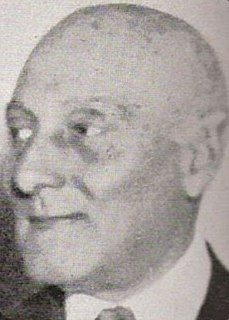
Leopoldo Melo was an Argentine lawyer, diplomat and politician. He was a leading figure in the Radical Civic Union, a nominee for President, and later Minister of Internal Affairs.
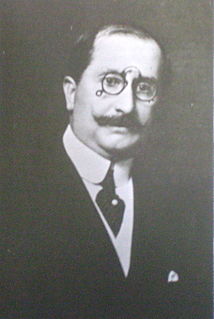
Vicente Gallo was an Argentine lawyer, academic and politician of the Radical Civic Union.
The period spanning from 1916 to 1930 in Argentina is known as the Radical Phase, as it began with the election of the Radical Civic Union (UCR) candidate Hipólito Yrigoyen, ending the conservative Generation of '80's domination on politics. Yrigoyen's second term, which started in 1928, was interrupted by Argentina's first military coup, which established José Félix Uriburu in power and initiated the Infamous Decade.

Elpidio González was an Argentine politician of the Radical Civic Union. He was Vice President from 1922 to 1928 in the Marcelo T. de Alvear administration.

The Argentine presidential election of 1931 was held on 8 November. With a turnout of 73.4%, it produced the following official results:

The Argentine general election of 1928 was held on 1 April, with a turnout of 80.9%.

The Argentine general election of 1916 was held on 2 April. Voters elected the President, legislators, and local officials. The first secret-ballot presidential elections in the nation's history, they were mandatory and had a turnout of 62.7%.

José Tamborini was an Argentine physician and historically significant politician.
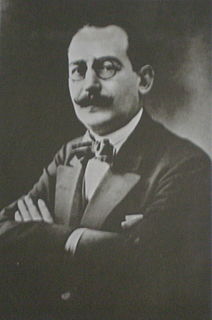
Enrique Mosca was an Argentine lawyer and politician prominent in the centrist Radical Civic Union (UCR).
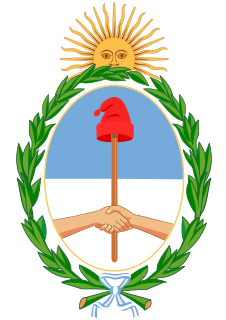
Argentine legislative elections of 1912 were held on 7 April 1912 for the Argentine Chamber of Deputies. The first free, democratic elections in the nation's history, the contest had a turnout of 68.5% and produced the following official results:

The Argentine presidential election of 1937 was held on 5 September 1937.
The Argentine legislative elections of 1924 were held on 7 March. Voters chose their legislators and numerous governors, and with a turnout of 44.2%, it produced the following results:
The Argentine legislative elections of 1926 were held on 7 March. Voters chose their legislators and numerous governors, and with a turnout of 49.2%, it produced the following results:

Ángel Dolores Rojas was an Argentine lawyer and politician.
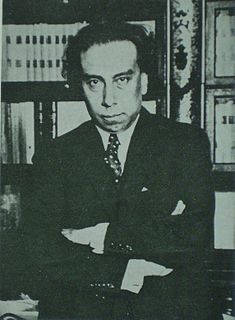
Mario Bravo was an Argentine politician and writer.
The Concordancia was a political alliance in Argentina. Three Presidents belonging to the Concordance were in power from 1931 to 1943, a period known in Argentina as the "Infamous Decade."